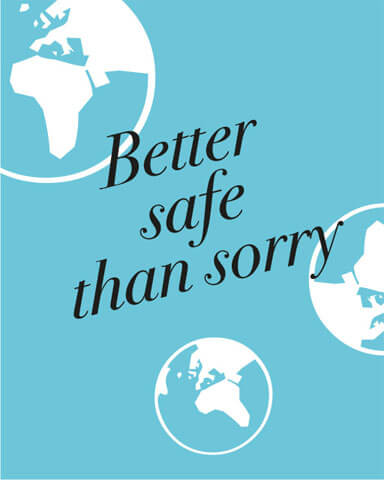The most important thing before each trip
Not packed your favorite bermudas or forgotten your sun hat? No problem. There are substitutes for this in most places. Not quite as exquisite, but serviceable. What you should never forget, however, is the medical countdown before a trip, at the end of which is the well-packed first-aid kit.
GloriousMe
THE MEDICAL TRAVEL COUNTDOWN
6 MONTHS BEFORE THE TRIP
For trips abroad, you should check the insurance coverage in case of illness. If you have statutory insurance, it makes sense to have health insurance abroad, even for some European countries.
When abroad, medical or hospital bills can quickly cost you a fortune, and in the event of serious illness or insufficient local medical care, you may need return medical transport by air…
Therefore, check in good time whether you need to take out additional health insurance abroad. These are often annual contracts that cover a certain number of vacation days. You should check this in detail for a contract that is still running.
With adequate advance notice, you will also have time to go through all other insurance documents at your leisure and compile them for the trip.
You may have credit card contracts or other insurance that provides for repatriation by air or coordination with your hospital in your home country.
You should compile these documents at your leisure and add to them as needed. Shortly before the trip you probably have many other things to do and are glad to have this somewhat time-consuming but very important part of the travel preparation well organized already at hand.
This allows you to focus on choosing and anticipating culinary, scenic or cultural highlights in the weeks leading up to your trip.
3 MONTHS BEFORE THE TRAVEL
Make an appointment with your primary care physician early to discuss specific measures, depending on your vacation destination and type of travel. Taking some medications, such as malaria prophylaxis, begins several days before departure.
Since things always get hectic in the last days and weeks before the vacation, you should schedule this doctor’s appointment well in advance. Depending on the destination, additional vaccinations or boosters may be required. All this should be done calmly and a few weeks before departure. Better to board the plane relaxed than freshly vaccinated.
1 WEEK BEFORE THE TRIP
Every smart traveler has a first-aid kit in his or her luggage and is therefore not dependent on pharmacies and doctors and their foreign language skills in the event of a minor mishap.
In addition, the quality standards for medicines abroad are different. Counterfeit or improperly stored medications are a problem in some travel countries.
ON ANY CASE
The medications you take regularly and specific medications your doctor has prescribed specifically for the trip, for example, malaria prophylaxis or seasickness medication, should definitely find room in your carry-on luggage.
THE FOLLOWING IS PART OF THE BASIC EQUIPMENT FOR EVERY TRIP:
– An effective remedy for diarrheal diseases
– A broad-spectrum pain reliever that you have already used successfully
– Means against insect bites and/or pure alcohol for disinfection
– Disinfectant for hands or minor wounds and mouth guard
– Sticking plaster
– Gauze bandages and sterile compresses
– Tweezers
– Clinical thermometer
– Safety pins
BETTER SAFE THAN SORRY
When traveling to developing countries, you should also carry your own supply of sterile disposable materials (syringes, needles and disposable gloves) in your luggage. And yes, the bag with these essentials should always be with you when you plan major trips locally.
If, as we hope, all has gone well and only the flight home remains, you can leave these sterile disposable materials in the country. In some exotic travel countries, sterile disposable materials are scarce.
Talk to the concierge, tour guide, or other person familiar with local conditions. In some countries a local health station is very happy about your donation and you have even more space in your suitcase for souvenirs or just nice, untarnished memories of your vacation.
However, if you do need a pharmacy while abroad, your best chances are at pharmacies located at the airport, in major shopping centers, or directly at an international hospital.
Likewise, the detailed contact information of the respective embassy of your home country belongs in the luggage. You can research the information via the Foreign Office. Even if you’re otherwise completely mobile – in this case, a piece of paper makes perfect sense, because if the worst comes to the worst, your battery might just be dead and the nearest Internet cafe might be miles away.
All done – then you can focus on the finer things in preparing for your trip. GloriousMe wishes Bon voyage!




